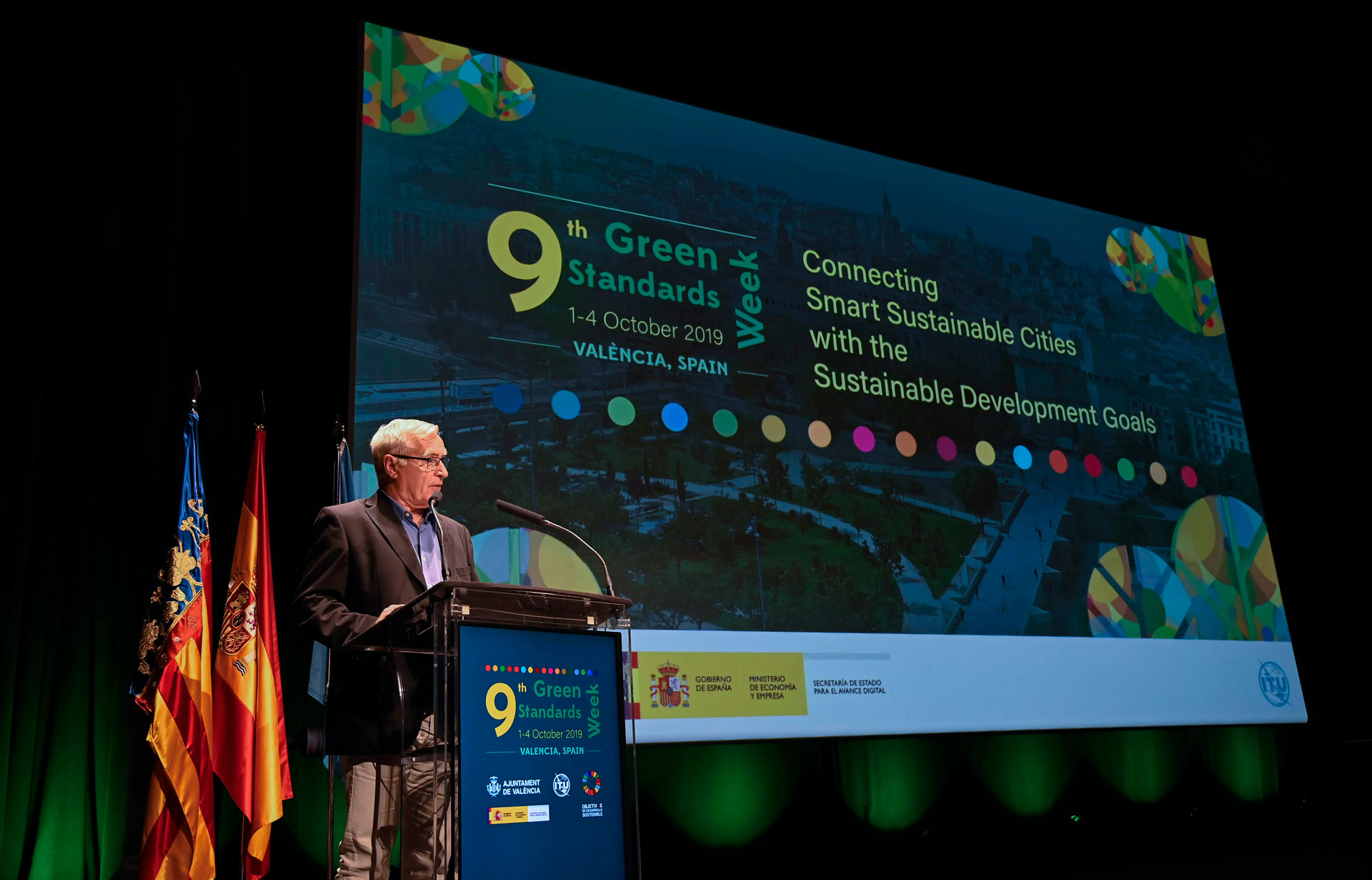“We, the participants of the 9th Green Standards Week, call on all concerned city stakeholders to act together in transitioning to a smart sustainable city and achieving the Sustainable Development Goals”

Call to Action from València
for connecting
smart sustainable cities
with the Sustainable Development Goals
9th Green Standards Week
Joan Ribó, Mayor of València, reading the document of the Call to Action.
València · 9th Green Standards Week · 1st October 2019.
València Conference Center
Connecting smart sustainable cities with the Sustainable Development Goals (SDGs):
The SDGs provide a concrete and measurable framework that city stakeholders can use as guidance to adopt a people-centric approach to smart sustainable cities. Initiatives, such as the United for Smart Sustainable Cities (U4SSC) have developed useful guidelines and effective tools that support cities in aligning their smart strategies with the SDGs, including the Key Performance Indicators for Smart Sustainable Cities. They also offer a collaborative platform where stakeholders can gather to engage in global dialogues and generate consensus on key issues that would help overcome the challenges of smart sustainable cities.
Making cities lead the way in the application of frontier technologies to protect the environment and tackle climate change:
Cities are the hubs for innovation and hold great potential to lead the way in applying frontier technologies to combat climate change. Artificial intelligence is being applied to enhance traffic management, estimate real-time precipitation to hydrological risk, and to manage e-waste. The Internet of Things is improving energy infrastructure to reduce carbon dioxide and Greenhouse Gas emissions. 5G water supply system is reducing water loss and distribution inefficiency. Digital twins are enhancing disaster risk planning and environmental resilience in cities. Robotics are also helping to monitor underwater climate change impacts and observing marine life to protect biodiversity.
Using international standards as guidance for the development of smart sustainable cities:
International standards such as UIT-T, Recommendations provide requirements, specifications, best practices and other important guidelines that support the deployment of ICTs and frontier technologies in smart sustainable cities. These standards offer guidelines that coordinate the development of the next generation network, define the capability of IoT-based emergency response systems, set common requirements of the interoperability of smart city platforms and IoT application, identify the characteristic of IoT services, evaluate the role of ICTs in smart sustainable cities and more.
Adopting the circular economy principles to reduce e-waste:
The circular economy (CE) model presents the most effective blueprint for managing ICTs sustainably. By implementing policies that encourage reusing, recycling, remanufacturing and refurbishing, the use of resource in the production of ICTs would be minimized and the value of each component will be retained in the product’s lifecycle for as long as possible. International standards including UIT-T Recommendations play an important role in accelerating circular actions. They contain guidelines that support the implementation of extended producer responsibility, development of a sustainable e-waste management system and more.
Implementing a smart city platform to integrate smart technologies:
Smart city platforms are crucial in collecting and analyzing data from traffic lights, smart sensors, and other open sources before identifying patterns and delivering insights that would relieve congestion at peak hours, optimize routes for public transportation, enhance citizen participation in the decision making process, improve public and social services, as well as government responsiveness to citizen’ demands, maximize resource efficiency and more. International standards provide an important source of guidance to ensure interoperability between platforms and their functionalities.
Taking a proactive stance to study the environmental performance of frontier technologies:
The environmental impacts of artificial intelligence, blockchain, IoT, Big Data, and digital twins among other frontier technologies are a growing concern that demands further investigation. Dedicated groups such as ITU-T Focus Group on “Environmental efficiency of artificial intelligence and other emerging technologies” provide the ideal platform for city stakeholders, field experts, representatives from civil society, the academia, the research community, service providers, and other to raise awareness of this key issue and to study the potential impacts that frontier technologies bring.
Involving citizens, researchers and other relevant stakeholder in developing standards and technologies to meet end user needs:
Innovative technologies, such as crowdsourcing applications, privacy-by-design applications, and other co-creation activities can contribute to better align the technology with the need of the citizens.
Adopting digital rights principles that ensure the inclusion of all people in the development of smart sustainable cities:
Principles related to privacy, freedom of expressions and non-discrimination should be incorporated by design into digital platforms to ensure the participation of all people, including the marginalized, women, youth and people with disabilities. We will work towards ensuring that everyone has access to to affordable and accessible digital services as well as the digital skills to make use of digital platforms and overcome the digital divide.
Accelerating the transformation of smart sustainable cities by establishing a circular strategic approach.
To leverage the sustainable transformation of a community into a smart sustainable city, it is paramount to understand the smart city not as a project but as a continuous change process and technology as an enabler. Three action steps form a continuous cycle that promotes the successful advancement of a community towards becoming a smart sustainable city and systematically accelerates the ecosystem of smart sustainable city solutions in a community. First, perform a status quo analysis implementing the U4SSC Key Performance Indicators to achieve the SDGs in order to get a clear overview of the current ecosystem of smart sustainable solutions. Second, assess needs and opportunities to foster smart sustainable development and prioritize potential solutions. Third, select and implement smart sustainable city solutions. Re-start with the circular strategic approach to assess results and to advance the transformation process over time.
The 2030 Agenda can only be met if we work together by boosting partnerships and mobilize expertise:
MEnhance cooperation at international, regional, national and local levels, between organizations, research institutes, academia, governments, industries, SMEs and civil society to build a smarter and more sustainable world. pequeñas y medianas empresas.

